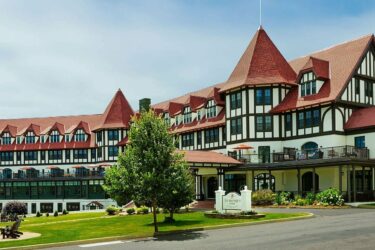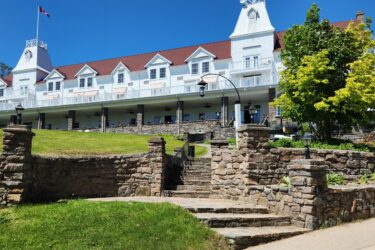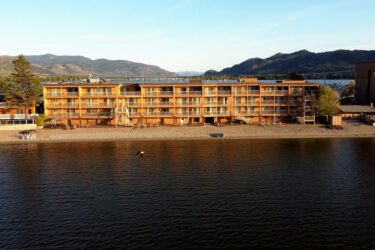
InnVest Hotels acquires The Algonquin Resort St. Andrews by‑the‑Sea, Autograph Collection and The Algonquin Golf Course
InnVest Hotels has acquired The Algonquin Resort St. Andrews by-the-Sea, Autograph Collection and The Algonquin Golf Course.
OTTAWA — Philip Mondor, president and CEO of Tourism HR Canada paints a vivid picture with stark numbers regarding the pandemic. THRC has prepared a toolkit to help with the recovery.
OTTAWA — Philip Mondor, president and CEO of Tourism HR Canada, paints a vivid picture with stark numbers regarding the pandemic. Canada’s hospitality workforce was hard hit in a very short window of time. In the first two weeks of the pandemic, Tourism Human Resources Canada estimated that there were about one million jobs displaced in the short term. This included 880,000 of those already working, and about 250,000 student summer jobs that wouldn’t be realized.
“Tourism covers five industries, and in this unfortunate time, we are looking at a long recovery and lasting scenario,” Mondortold CLN. “We are going to miss a whole season [summer], and recovery will take two or even three years. Forty per cent of the workforce is not working, and another 30 per cent are thinking they will be called back. One example — in the month of March tourism lost 448,600 jobs. In April, it lost another 433,100, for a total of 881,700 jobs lost. This means that we lost 43 per cent of our workforce those two months alone. And that still doesn’t account for he 250,000 student and summer workers. The longer the closures exist, the more permanent this will be.”
About 30 per cent of Canadian hotels are closed at the moment, Mondor said. “Those that are open, are experiencing 10 per cent occupancy.” The unemployment rates in tourism are at 43.3 per cent, the highest they have ever been, compared to the Canadian labour force, which is at 13 per cent at the moment.
“Our biggest concern in the industry is our liquidity and survival, since hotels lost all their income in a very short window of time. Our workforce side is the second highest priority, as tourism’s ability to recover and grow depends on people.
“The emphasis is on rebuilding the workforce. Recovery is spotty, as every region and province starts to ease restrictions on different timelines and in different ways,” Mondor noted. “It’s very confusing to the consumer because the restrictions prevent them from travelling in some ways. The cycle of opening is variable and there are vast differences in the rules governing reopening.”
Tourism HR Canada’s response to all of this is to develop a toolkit. “As an organization, everything we touch is driven by market demand and need. As part of a broader COVID phenomenon, we have a retention, recovery and resilience strategy that is all to do with the workforce. We decided to delve deeper into the themes and tools we need for a more comprehensive program.”
THRC researchers talked to employees. The idea was to create a hub with practical tools and resources vetted by employees. These resources will be constantly evaluated — not static — and will navigate a two-year horizon. “The idea was to help employers address issues and needs, and to make those resources accessible,” said Mondor. As a result, the Toolkit is free, the ideas are easily applied, the tools readily implemented and the examples are familiar. It incorporates the emerit programs that the federal government has invested in for more than 25 years, building on a lot of previous knowledge, including the very popular Business Builders and HR Materials.
“The crisis led us to react and create these resources with a lens on small business, but it could function for large businesses as well as different service sectors outside of tourism,” Mondor said.
THRC partnered with Alpha and Twenty31 Consulting to build the platform and talk to the sector. Provincial and national HR organizations and associations were also very much involved. “The partnership approach led to the quality and strength of the program,” Mondor noted.
While the Toolkit focuses on some of the same elements as emerit, it has been tailored to encompass the new realities. For example, financing of a business startup [as outlined in emerit] is very different from financing during a recovery.
“The root of it all is to reframe what their business plan will be in the new market, with new protocols to follow. The industry is getting together to examine questions like, ‘What is a wedding going to look like?’ It involved rethinking, remodelling (human resource planning) — stuff many business leaders have dealt with before. We start with something they know, and then deal with these new matters. We take other tools in an new direction, dealing with crises and resilience.”
What will the new world look like?
Mondor said the players in the tourism industry are connecting in a fantastic way. “National associations and governments ave stepped up with a level of coordination and commitment — there’s a real level of camaraderie and intent. “The timing of this couldn’t have been worse, with alarm bells sounding, people wondering how long it will last and how it will affect travel, intentions and conferences. The tourism season usually gears up in April and May and goes through summer and into fall. But now we’re dealing with closures, no airlines and border controls. All conferences, weddings and concerts have been called off and can’t be resumed quickly. These is still no sense of the scale of opening, and a vaccine is a year away at least.”
Mondor predicts that in the next six to 12 months, travel will start close to home, keeping in mind that people are strapped financially and will take more modest trips. “They will not be coming from high-ROI markets,” Mondor said. “We’re going to see a much slower pace of recovery and it’s going to take longer than six to 12 months.”
And there will be changes in the ways people operate. Flights and business meetings are one example. “At the moment we are learning to work through virtual means. If we need to work that way for awhile, people will get used to it. Budget and scale of business meeting will not come back for awhile, although there will be some pent up demand to get out,” Mondor said.
“I think hoteliers must invest in foundational new business and human resources plans. Essential to these plans, they will have to consider the community as part of the process, if they’re going to get it right. We can’t stumble through this thing — it’s a whole new playing field. We have to think very carefully about what we will look like during and post-COVID.



InnVest Hotels has acquired The Algonquin Resort St. Andrews by-the-Sea, Autograph Collection and The Algonquin Golf Course.

The new owners of the famed Windermere House hotel and resort on Muskoka’s Lake Rosseau intend to revitalize the building and its amenities while preserving the property’s historical integrity.

Proactive Hospitality has acquired the Coast Osoyoos Beach Hotel, B.C. CFO Capital arranged acquisition financing for the deal.

Tribute Portfolio – part of Marriott Bonvoy's extraordinary portfolio of 31 hotel brands – continues to grow its global family of characterful hotels with Honeyrose Hotel Montreal, a Tribute Portfolio Hotel, the brand's…